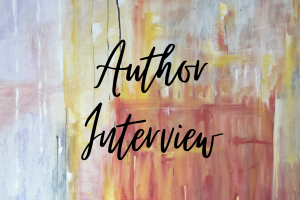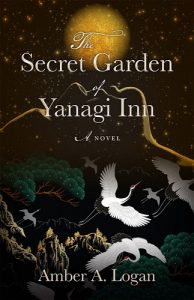Increasing Personal Connection: An Interview with Amber A. Logan

The writing community is vast, and yet, it’s also very small. And that community is how I get introduced to writers I might not otherwise discover on my own. Author Amber A. Logan is one of those folks; she’s also a freelance editor and university instructor, which means I could have asked her a ton of questions based on our common interests and career choices, but I had to be concise! Amber’s debut novel, The Secret Garden of Yanagi Inn (a retelling of the classic The Secret Garden), released last week, and already, positive reviews are rolling in. Multiple reviewers have called the book “atmospheric” and “serene,” and author Paulette Kennedy wrote, “A story of redemption, forgiveness, and the transformative power of grief. Beautifully moving and inspired.” When she’s not teaching, writing, or editing, Amber likes to travel (international is a favorite!), exercise, and read, all of which will lead toward more fantastic stories. At this time of the year and with a book to launch, I’m so thankful for Amber’s time and attention to my questions.
Christina: Congratulations on the publication of The Secret Garden of Yanagi Inn. The original tale is a beloved classic. What inspired you to retell the story and set it in Japan? What sorts of obstacles does an author have to get past when writing a retelling?
Amber: I loved The Secret Garden growing up, but always found myself secretly wishing there actually was a ghost in the house. So when I was trying to decide which story to retell next (I love retellings!), I found myself thinking of The Secret Garden and asking “What if there was a ghost? What if instead of moving from the East to the West (India to England), my character moved from the West to the East (US to Japan)? What if the garden was an overgrown Japanese garden and the robin was a red-crowned crane . . . and then my mind just took off running.
I think the biggest obstacle when writing a retelling is finding the right balance between being true to the original story and making the story special on its own terms. I almost always start off adhering fairly closely to the original (in terms of plot lines, story beats) and during revisions I start to veer further and further away as I discover my own story’s meaning and direction.
Christina: Does the Yanagi Inn serve as a character in the story? How much research (including travel) went into getting the details of the inn, the setting, and the Japanese culture just right?
Amber: Yanagi Inn definitely has a strong presence in the story. I knew that the atmosphere (of the inn and the gardens) would be a large part of the book, not just because the original The Secret Garden is a very sensory book, but also because my main character, Mari, is a photographer. I knew she would notice the smallest details and be looking for beautiful shots everywhere she went. This really encouraged me to give a lot of setting details.
While I’ve been to Japan many times and have visited Japanese gardens around the world, I still spent a lot of time researching ryokans and gardens for this book. I pored through lovely photography books about Japanese gardens and traditional architecture, and visited gardens in the US (it was during the pandemic, so I couldn’t travel to Japan). I also watched movies and videos, trying to get a sense of the sounds Mari would experience walking through the gardens. Since photography is a big part of the book, I also had to do research on photography and asked a photographer friend to read over all my camera details to make sure they were accurate. I hired a Japanese cultural sensitivity reader to provide me feedback over the whole novel as well, which was invaluable.
Christina: In one of your blog posts, you said that you like to “increase the emotional impact” of your stories by increasing “the personal connections between the people, places, and things.” How did you do this for the novel?
Amber: I love this question! When I first started drafting The Secret Garden of Yanagi Inn, I didn’t yet know how the characters were interconnected. It was through the revision process that I started to really weave the characters’ stories together more and more. Each character is intricately tied not just to the mystery of the inn, but also to each other. The reader uncovers these connections alongside the main character as the book progresses, so that by the end we finally get to see the whole web. I did this not only with characters, but also with certain objects in the story; in early drafts I had some items that kept popping up, and it was only during revisions that I was able to weave significance into those physical objects as well.
Christina: You’re also a short-story and flash-fiction writer. Which form comes most naturally to you? Do you find one to be easier to write than the others?
Amber: It’s funny, I started out writing poetry and then found myself writing increasingly longer pieces: first flash fiction, then short stories, and finally I started tackling novels. I still write the occasional flash fiction piece or short story (and I’d like to write more poetry), but I tend to focus the most on novels now. I find novel-writing the most satisfying, so that is where my heart lies.
Christina: Like so many authors, you write when you can, including in the car when your son has violin lessons. (I’ve been there myself, many times!) What’s one tip you can offer writers who are just starting out?
Amber: One piece of advice I’d have (related to the “write when you can” concept) is to cultivate a writing routine, but make sure you’re comfortable breaking it. My favorite place to write is on the lounge in my living room, with a glass of wine beside me. It’s comfortable, and I’ve spent many, many hours writing there, so when I settle in I feel like it’s time to write! And that can be wonderful—like a stimulus that puts my mind into writing mode. But I think some authors can get too comfortable with their routines (their special chair, favorite candle burning, a specific soundtrack playing, etc.) to the point where they feel dependent upon them. Then it can become an excuse to NOT write if you don’t have the set-up just right. So while I’m all on-board the little tricks and cues that help you get into the writing mood, make sure to write elsewhere, too. Take your laptop with you to a coffee shop, the library, an airport, the car when you know you have to wait for a kid’s music lesson to be over, etc. I think that is what keeps me flexible.
Christina: You’re a part of the 2022 Debut Group. Tell us a little bit about the group and what being a part of it has done for you. What have you learned from the group?
Amber: I’ve really enjoyed being part of the group. It was something I’d heard recommended back when I was still querying, so I was excited when I finally had a pub date and sought out the group on Facebook. The primary role of the group is to help debut authors support each other, which is a lovely thing. We follow each other on social media, promote each other’s posts, swap books and leave reviews, etc. It has also been a great place to ask questions (the “is this normal?” kind of questions new authors have, advice on building websites or buying book swag, etc.). Being a late-2022 pub date author, I get to benefit from the wisdom of the earlier debuts, which has been a blessing.
Christina: Your bio states that you like “exploring unusual vegetarian foods.” What’s the most unusual you’ve come across? What’s your favorite? When you travel, is finding unusual foods something you like to do?
Amber: The most unusual? That’s tough, because food is so darned culture-specific, and what seems odd to me is likely completely normal for another person. For example, natto (a fermented, sticky soybean dish) is rather odd to the American palate, but is fairly common in Japan. In general, I’m a big fan of fermented foods, so I always want to try dishes that have some kind of sauerkraut or kimchi (provided it’s vegetarian, of course—I’ve been a vegetarian for over 25 years now). I am definitely the type of person who is more likely to pick the menu item that looks “interesting” than the menu item that looks delicious, so I do try to eat unusual flavors wherever I go—particularly when traveling internationally.
Christina: What’s next for you?
Amber: I’ve got several more retellings up my sleeve! I have a few in the works based on lesser-known fairy tales, and one based on a weird old Victorian novel called The Haunted Woman by David Lindsay. Kind of a part ghost story, part portal fantasy book with an uncanny staircase.
Amber can be found in multiple places!
Website: https://www.amberalogan.com/
Instagram: @amberalogan
Twitter: @AmberAnnLogan
Thanks to Amber for agreeing to this interview! If you know of an artist, author, or podcaster who’d like to be featured in an interview (or you are an author who would like to be featured), feel free to leave a comment or email me via my contact page.

